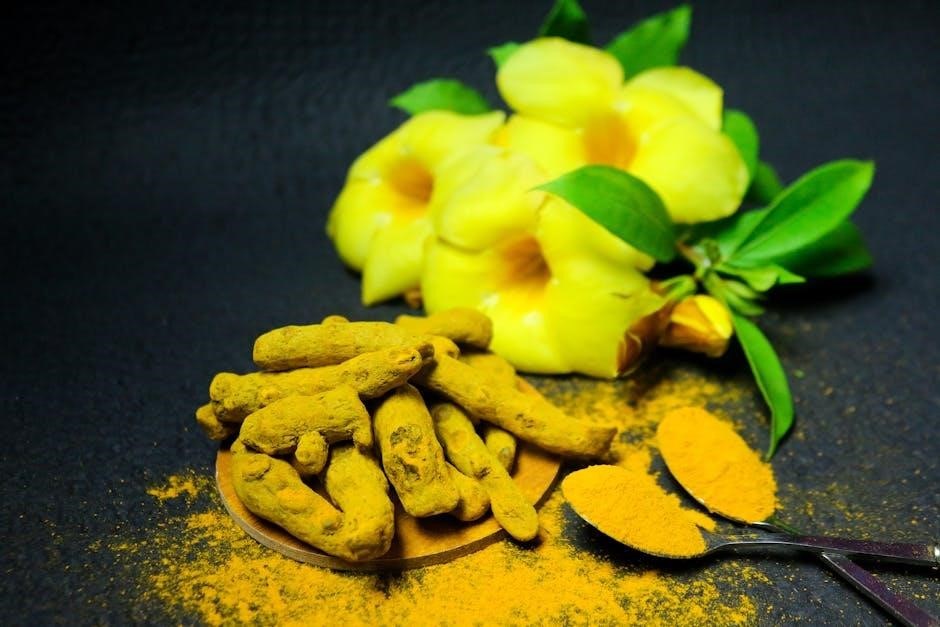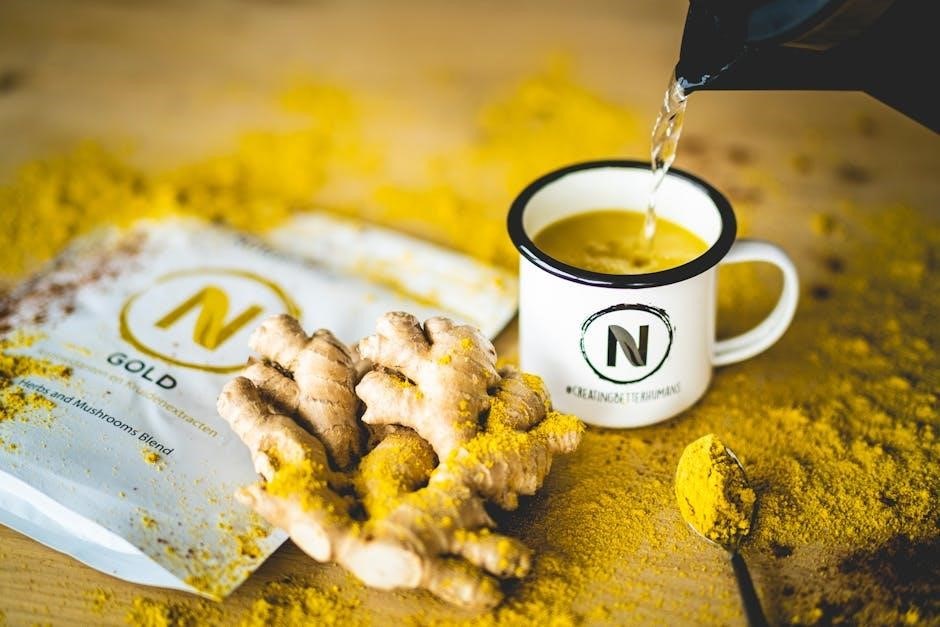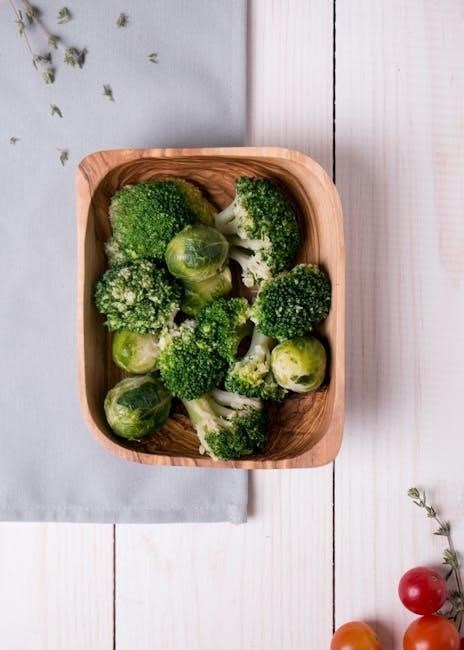Dr. Joshua Levitt’s guide focuses on reducing inflammation through diet, emphasizing whole foods, omega-3s, and antioxidants. It helps combat chronic diseases and promotes long-term health benefits naturally.
1.1 Overview of Dr; Joshua Levitt’s Approach to Anti-Inflammatory Nutrition
Dr. Joshua Levitt’s approach emphasizes a holistic, natural method to combat inflammation through diet. He advocates for a focus on whole, unprocessed foods rich in omega-3 fatty acids and antioxidants, while avoiding pro-inflammatory foods like refined carbohydrates and red meat. His guide also highlights the importance of hydration, exercise, and stress management to support overall health and reduce inflammation effectively. This approach aims to promote long-term well-being by addressing the root causes of inflammation through sustainable lifestyle changes.
1.2 Importance of Diet in Reducing Inflammation
Diet plays a crucial role in managing inflammation, as certain foods can either trigger or reduce inflammatory responses. Consuming anti-inflammatory foods helps mitigate chronic inflammation, which is linked to conditions like arthritis, heart disease, and diabetes. A well-balanced diet rich in fruits, vegetables, whole grains, and omega-3 fatty acids supports the body’s natural healing processes, promoting overall health and reducing the risk of chronic diseases. This approach underscores the significance of nutrition in preventing and managing inflammation effectively.
1.3 Benefits of Following an Anti-Inflammatory Diet
Adopting an anti-inflammatory diet offers significant health benefits, including reduced inflammation, improved immune function, and enhanced overall well-being. It helps mitigate chronic diseases like arthritis, diabetes, and heart disease by promoting a balanced intake of nutrients. Regular consumption of anti-inflammatory foods supports digestive health, boosts energy levels, and may even improve mental clarity. By focusing on whole, nutrient-rich foods, individuals can experience long-term health improvements and a reduced risk of inflammation-related conditions, leading to a more vibrant and active lifestyle.

Core Principles of the Anti-Inflammatory Diet
The diet emphasizes whole, unprocessed foods, avoiding pro-inflammatory items, and incorporating omega-3s and antioxidants to reduce inflammation and promote overall health naturally and effectively.
2.1 Focus on Whole, Unprocessed Foods
Emphasizing whole, unprocessed foods is central to reducing inflammation. These foods, such as fruits, vegetables, and whole grains, retain their natural nutrients and fiber, which help combat inflammation. Processed foods often contain unhealthy additives and sugars that can trigger inflammation. By prioritizing unprocessed options, individuals can avoid harmful ingredients and support their body’s natural healing processes. This approach promotes a balanced diet rich in essential vitamins and minerals, fostering long-term health benefits and reducing the risk of chronic inflammation.
2.2 Avoiding Pro-Inflammatory Foods
Avoiding pro-inflammatory foods is crucial for reducing inflammation. These include refined carbohydrates, sugary snacks, fried foods, processed meats, and excessive red meat. These foods trigger inflammation by promoting oxidative stress and releasing harmful compounds. Eliminating them from your diet helps minimize inflammation and supports overall health. Opting for healthier alternatives, such as whole grains and lean proteins, is a key step in managing inflammation effectively. This dietary adjustment is simple yet impactful for long-term well-being.
2.3 The Role of Omega-3 Fatty Acids
Omega-3 fatty acids play a vital role in reducing inflammation by suppressing pro-inflammatory molecules. Found abundantly in fatty fish like salmon and mackerel, these fats help lower inflammation markers and improve heart health. Dr. Levitt emphasizes their importance in balancing the body’s inflammatory responses and promoting healing. Incorporating omega-3-rich foods into your diet is essential for maintaining long-term health and preventing chronic diseases.
2.4 Incorporating Antioxidant-Rich Foods
Antioxidant-rich foods are essential in Dr. Levitt’s guide, as they neutralize free radicals that trigger inflammation. Berries, leafy greens, and colorful vegetables are packed with antioxidants like vitamins C and E, polyphenols, and carotenoids. These compounds combat oxidative stress, reducing inflammation and protecting cells from damage. Incorporating these foods enhances immune function, supports detoxification, and lowers the risk of chronic diseases. Antioxidants also promote a balanced inflammatory response, making them a cornerstone of Dr. Levitt’s holistic approach to health and wellness.

Foods to Include in Your Anti-Inflammatory Diet
Focus on whole, nutrient-dense foods like fatty fish, berries, leafy greens, and whole grains to reduce inflammation and promote healing. These foods are rich in omega-3s, antioxidants, and fiber.
3.1 Fruits: Berries, Citrus, and Other Anti-Inflammatory Options
Berries like blueberries, strawberries, and raspberries are rich in antioxidants, which help combat inflammation. Citrus fruits, such as oranges and grapefruits, provide vitamin C, reducing oxidative stress. Apples and pears, high in fiber, support gut health, while cherries contain anthocyanins, known for their anti-inflammatory properties. Incorporating these fruits into your diet can significantly reduce inflammation and promote overall well-being. Dr. Levitt emphasizes their role in a balanced, anti-inflammatory lifestyle.
3.2 Vegetables: Cruciferous, Leafy Greens, and Colorful Varieties
Cruciferous vegetables like broccoli, Brussels sprouts, and cauliflower are rich in sulforaphane, which combats inflammation. Leafy greens, such as spinach and kale, provide antioxidants and anti-inflammatory compounds. Colorful varieties like bell peppers, carrots, and beets offer carotenoids and vitamin C, further reducing inflammation. These vegetables are essential in Dr. Levitt’s guide, promoting a balanced and nutrient-dense diet that supports overall health and well-being by targeting inflammatory responses effectively.
3.3 Whole Grains: Quinoa, Brown Rice, and Other Inflammation-Fighting Grains
Whole grains like quinoa, brown rice, and Kamut are rich in fiber, vitamins, and minerals, making them a cornerstone of Dr. Levitt’s anti-inflammatory diet. They contain antioxidants and phytonutrients that help reduce inflammation. Quinoa, a complete protein, supports immune function, while brown rice provides magnesium, which relaxes muscles and improves blood flow. These grains are low on the glycemic index, preventing sudden spikes in blood sugar and promoting sustained energy. Incorporating them into meals helps combat chronic inflammation and supports overall well-being effectively.
3.4 Legumes: Beans, Lentils, and Their Anti-Inflammatory Properties
Legumes, such as beans, lentils, and chickpeas, are packed with anti-inflammatory compounds like polyphenols and fiber. They are rich in antioxidants that neutralize free radicals, reducing inflammation. Lentils and chickpeas contain specific anti-inflammatory enzymes that support immune health. Dr. Levitt recommends incorporating a variety of legumes into meals to enhance nutrient intake and combat inflammation naturally. Their high fiber content also promotes gut health, further supporting the body’s anti-inflammatory responses effectively and sustainably.
3.5 Nuts and Seeds: Walnuts, Chia, Flax, and More
Nuts and seeds, such as walnuts, chia, and flaxseeds, are rich in omega-3 fatty acids and antioxidants, making them potent anti-inflammatory foods. Walnuts contain alpha-linolenic acid (ALA), which reduces inflammation. Chia seeds are high in fiber and antioxidants, while flaxseeds provide lignans that combat inflammation. Dr. Levitt recommends incorporating these into meals for their nutrient-dense, anti-inflammatory properties. They also support heart health and provide essential minerals like magnesium and zinc, making them a versatile addition to an anti-inflammatory diet.
3.6 Fatty Fish: Salmon, Mackerel, and Sardines
Fatty fish like salmon, mackerel, and sardines are rich in omega-3 fatty acids, particularly EPA and DHA, which are potent anti-inflammatory agents. These fish help reduce inflammation by combating pro-inflammatory molecules in the body. Regular consumption supports heart health, improves brain function, and may alleviate conditions like arthritis. Dr. Levitt recommends incorporating fatty fish into meals to harness their anti-inflammatory benefits and promote overall well-being. They are a cornerstone of an anti-inflammatory diet due to their high nutrient density and health-promoting properties.
3.7 Fermented Foods: Yogurt, Kimchi, Sauerkraut, and Kefir
Fermented foods like yogurt, kimchi, sauerkraut, and kefir are rich in probiotics, which support gut health and reduce inflammation. These foods contain anti-inflammatory compounds that promote a balanced microbiome, boosting immune function and overall well-being. Dr. Levitt emphasizes their role in combating chronic inflammation and improving digestion. Regular consumption of fermented foods can enhance the body’s ability to fight inflammation and maintain long-term health, making them a valuable addition to an anti-inflammatory diet.

Foods to Avoid in an Anti-Inflammatory Diet
Dr. Levitt highlights avoiding refined carbs, processed meats, fried foods, excessive red meat, and artificial additives, as these trigger inflammation and hinder overall health benefits.
4.1 Refined Carbohydrates: Sugary Snacks and White Bread
Refined carbohydrates, such as sugary snacks and white bread, are high on the glycemic index, causing rapid blood sugar spikes and insulin surges. These foods promote inflammation by triggering the production of pro-inflammatory molecules. Regular consumption can lead to chronic inflammation, increasing the risk of conditions like arthritis, heart disease, and diabetes. Dr. Levitt recommends avoiding these processed carbs and opting for whole, nutrient-dense alternatives to maintain a balanced and anti-inflammatory diet that supports long-term health.
4.2 Processed Meats: Hot Dogs, Sausages, and Bacon
Processed meats like hot dogs, sausages, and bacon are high in advanced glycation end (AGE) products, preservatives, and sodium, which can trigger inflammation. These foods contain pro-inflammatory compounds that may increase the risk of chronic diseases, such as heart disease and certain cancers. Dr. Levitt advises limiting or avoiding processed meats and opting for lean, organic, or grass-fed protein sources instead. Choosing whole, unprocessed foods helps reduce inflammation and supports overall health. Always check labels to avoid hidden additives.
4.3 Fried Foods and Excessive Oil Consumption
Fried foods and excessive oil consumption are linked to increased inflammation due to their high calorie and unhealthy fat content. These foods often contain advanced glycation end (AGE) products, which stimulate inflammatory responses. Dr. Levitt recommends avoiding fried foods like fries, doughnuts, and fried chicken, as they promote chronic inflammation and contribute to conditions like heart disease and diabetes. Opting for baked, grilled, or steamed alternatives and using minimal, healthy oils can significantly reduce inflammation and improve overall health.
4.4 Red Meat: Moderation and Healthier Alternatives
Red meat can trigger inflammation due to its saturated fat content and advanced glycation end (AGE) products, which promote inflammatory responses. Dr. Levitt advises moderation, suggesting leaner cuts or grass-fed beef, which contains anti-inflammatory omega-3s and conjugated linoleic acid (CLA). Healthier alternatives include plant-based proteins like beans, lentils, and tofu, which reduce inflammation and provide essential nutrients. Balancing red meat consumption with these options supports overall health and minimizes inflammatory risks.
4.5 Artificial Additives and Preservatives
Artificial additives and preservatives, such as MSG, aspartame, and artificial colors, can trigger inflammation by disrupting gut health and promoting oxidative stress. Dr. Levitt recommends avoiding processed foods containing these substances, as they can exacerbate inflammatory conditions; Opting for natural, whole foods and reading labels to identify hidden additives are key strategies. Prioritizing fresh, organic ingredients and limiting exposure to synthetic preservatives helps maintain a balanced, anti-inflammatory diet and supports long-term wellness.

Meal Planning and Recipes
Dr. Levitt’s guide offers practical meal plans and recipes, featuring anti-inflammatory foods like smoothies, salads, stir-fries, and baked fish, ensuring flavorful and nutritious options for everyday meals.
5.1 Breakfast Ideas: Anti-Inflammatory Smoothies and Oatmeal
Start your day with Dr. Levitt’s anti-inflammatory breakfast ideas, featuring vibrant smoothies packed with berries, spinach, and almond milk, or omega-3 rich chia seed pudding. Oatmeal topped with walnuts, cinnamon, and fresh fruit offers sustained energy and inflammation-fighting benefits. These nutrient-dense options are designed to kickstart your metabolism while minimizing inflammatory responses. Incorporate antioxidant-rich ingredients like turmeric, ginger, and flaxseeds for added health benefits, ensuring a delicious and healing start to your morning.
5.2 Lunch Options: Salads, Soups, and Grilled Fish
Dr. Levitt recommends vibrant salads with leafy greens, colorful vegetables, and toppings like avocado, nuts, and seeds for a nutrient-rich lunch. Soups, such as those made with quinoa, sweet potatoes, and carrots, offer anti-inflammatory benefits and are easily digestible. Grilled fish like salmon or mackerel, paired with steamed vegetables, provides omega-3 fatty acids and antioxidants. These options are designed to fuel your body while reducing inflammation, ensuring a balanced and satisfying midday meal that aligns with Dr. Levitt’s dietary principles.
5.3 Dinner Recipes: Stir-Fries, Baked Fish, and Vegetable Dishes
Dr. Levitt’s guide suggests anti-inflammatory dinner recipes like stir-fries loaded with colorful vegetables, garlic, and ginger, which are rich in antioxidants. Baked fish such as salmon or mackerel provides omega-3 fatty acids, while hearty vegetable dishes like roasted sweet potatoes and Brussels sprouts offer anti-inflammatory benefits. These meals are designed to promote healing, satisfy hunger, and align with Dr. Levitt’s focus on whole, nutrient-dense foods, ensuring a balanced and flavorful end to your day.
5.4 Snacks: Nuts, Seeds, and Fresh Fruits
Dr. Joshua Levitt recommends snacks like nuts and seeds for their anti-inflammatory properties. Walnuts and chia seeds are rich in omega-3s, while flaxseeds provide fiber and antioxidants. Fresh fruits such as berries, apples, and pears are also excellent choices, offering vitamins and anti-inflammatory compounds. These snacks support immune function and energy levels without triggering inflammation. Opt for unsalted, unsweetened options to maximize benefits. Portion control is key, as even healthy snacks can contribute to calorie overconsumption if eaten in excess.
Lifestyle Factors That Support an Anti-Inflammatory Diet
Hydration, exercise, sleep, and stress management are essential lifestyle factors that promote anti-inflammatory benefits, enhancing overall health and complementing a balanced diet.
6.1 The Role of Hydration: Water, Herbal Teas, and Green Juice
Hydration is crucial for flushing toxins and reducing inflammation. Water is essential, while herbal teas offer antioxidants. Green juice, rich in vitamins and minerals, supports nutrient absorption and inflammation reduction, promoting overall health and well-being.
6.2 Exercise: How Physical Activity Reduces Inflammation
Regular physical activity plays a key role in reducing inflammation by improving blood flow and strengthening the immune system. Activities like walking, cycling, or swimming promote the release of anti-inflammatory compounds. Strength training and yoga also help by enhancing muscle function and reducing stress, which contributes to inflammation. Consistent exercise routines can lower pro-inflammatory markers, supporting long-term health and preventing chronic diseases. Incorporating a mix of aerobic and strength exercises is recommended for optimal anti-inflammatory benefits.
6.3 Sleep: Its Impact on Inflammation and Overall Health
Sleep plays a crucial role in regulating inflammation. Chronic sleep deprivation can increase pro-inflammatory markers, leading to heightened inflammation and chronic disease risk. Adequate sleep supports the body’s natural repair processes, reducing inflammatory responses. Dr. Levitt emphasizes that 7-9 hours of quality sleep per night is essential for optimal anti-inflammatory benefits. Poor sleep quality can disrupt immune function, while consistent sleep schedules help maintain a healthy inflammatory balance, promoting overall well-being and resilience.
6.4 Stress Management: Meditation, Yoga, and Deep Breathing
Chronic stress triggers inflammation, making stress management essential for anti-inflammatory health. Techniques like meditation, yoga, and deep breathing reduce cortisol levels, lowering inflammation. These practices promote relaxation, improve mood, and enhance immune function. Dr. Levitt recommends incorporating mindfulness exercises to mitigate stress-induced inflammation. Regular practice fosters a balanced immune response, supporting overall well-being. By combining these methods with a healthy diet, individuals can create a holistic approach to inflammation reduction and long-term health optimization.

Scientific Evidence Supporting the Anti-Inflammatory Diet
Studies highlight the anti-inflammatory diet’s effectiveness, with clinical trials showing reductions in inflammatory markers. Omega-3s and antioxidants play key roles in mitigating inflammation, supported by extensive research.
7.1 Studies on Omega-3 Fatty Acids and Inflammation
Research consistently shows omega-3 fatty acids, particularly EPA and DHA, significantly reduce inflammation. Found in fatty fish like salmon and mackerel, these fats inhibit inflammatory pathways, lowering markers such as C-reactive protein. Clinical trials demonstrate their effectiveness in managing conditions like rheumatoid arthritis and cardiovascular disease. Dr. Levitt emphasizes their role in his guide, citing studies that highlight omega-3s’ ability to modulate the immune response and promote healing. Regular consumption is linked to improved outcomes in chronic inflammatory diseases.
7.2 Research on Antioxidants and Their Role in Reducing Inflammation
Antioxidants, such as vitamins C and E, and polyphenols, play a crucial role in combating inflammation by neutralizing free radicals. Foods rich in antioxidants, including berries, citrus fruits, and leafy greens, have been shown to reduce inflammatory markers. Studies demonstrate that antioxidants can mitigate oxidative stress, a key driver of inflammation. Dr. Levitt’s guide highlights research linking antioxidant intake to improved outcomes in conditions like arthritis and cardiovascular disease, emphasizing their importance in a balanced anti-inflammatory diet.
7.3 The Impact of Whole Foods on Chronic Disease Prevention
Whole foods, such as vegetables, whole grains, and legumes, are foundational in Dr. Levitt’s guide for their ability to reduce chronic disease risks. These foods are rich in nutrients, fiber, and antioxidants, which help regulate inflammation and improve overall health. Studies show that diets centered on whole foods significantly lower the risk of heart disease, diabetes, and certain cancers. By emphasizing unprocessed ingredients, Dr. Levitt’s approach promotes long-term wellness and aligns with scientific evidence supporting whole foods’ protective effects against chronic conditions.

Common Misconceptions About Anti-Inflammatory Diets
Some believe anti-inflammatory diets require eliminating all carbs or fats, but they actually focus on balancing nutrient-dense foods. Misconceptions about strict restrictions are common, while the truth emphasizes variety and moderation to reduce inflammation effectively.
8.1 Debunking Myths About Carbohydrates and Inflammation
Not all carbohydrates are inflammatory. Whole, unprocessed carbs like whole grains, fruits, and vegetables are rich in fiber, vitamins, and antioxidants, which actually reduce inflammation. The myth that all carbs are harmful stems from confusion with refined carbohydrates, such as sugary snacks and white bread, which can trigger inflammation. The quality of the carbohydrate matters, not the carb itself. Fiber in whole foods supports gut health, further combating inflammation. Balancing nutrient-dense carbs is key to an anti-inflammatory diet.
8.2 Clarifying the Role of Fats in the Diet
Fats are not inherently harmful; their impact depends on the type. Healthy fats, like avocados, nuts, seeds, and olive oil, reduce inflammation and support heart health. Omega-3 fatty acids, found in fatty fish, are particularly beneficial. Processed and fried foods, however, contain harmful fats that promote inflammation. Balancing quality fats is crucial for overall well-being. Moderation and choosing the right sources are key to harnessing the benefits of fats without triggering inflammation.
8.3 Understanding Portion Control and Moderation
Portion control and moderation are essential for maintaining a balanced diet. While certain foods are beneficial, overconsumption can lead to inflammation. Even healthy foods, like nuts or whole grains, should be eaten in measured amounts. Moderation also applies to treats, allowing occasional indulgence without guilt. This approach promotes sustainability and prevents extremes, ensuring a variety of nutrients while avoiding triggers. Balancing quantities helps maintain overall health and supports long-term anti-inflammatory goals effectively.

Expert Opinions and Testimonials
Dr. Joshua Levitt’s guide is praised by health professionals for its evidence-based approach. Many individuals report reduced inflammation and improved well-being after following his recommendations.
9.1 Dr. Joshua Levitt’s Insights on Long-Term Benefits
Dr. Joshua Levitt emphasizes that adopting an anti-inflammatory diet offers numerous long-term benefits. By focusing on omega-3 rich foods, antioxidants, and avoiding pro-inflammatory items, individuals can significantly reduce chronic inflammation. This approach not only improves overall health but also helps prevent diseases like heart disease and diabetes. Levitt’s guide provides a sustainable eating plan, encouraging a long-term commitment to wellness through balanced nutrition.
9.2 Success Stories from Individuals Who Followed the Guide
Many individuals have reported significant improvements after adopting Dr. Joshua Levitt’s anti-inflammatory diet. Success stories highlight reduced joint pain, improved digestion, and enhanced overall well-being. Some followers noted a decrease in chronic inflammation-related conditions, such as arthritis and digestive disorders. The diet’s focus on whole, nutrient-rich foods has empowered individuals to take control of their health. These testimonials underscore the guide’s effectiveness in promoting long-term wellness and improving quality of life for those who adhere to its principles.
9.3 Endorsements from Other Health Professionals
Dr. Joshua Levitt’s anti-inflammatory food guide has received widespread acclaim from health professionals. Nutritionists and doctors praise its scientifically-backed approach, emphasizing whole foods and omega-3s. Many experts highlight its practicality and effectiveness in reducing inflammation. The guide is often recommended for patients with chronic conditions, as it aligns with medical advice for improving overall health. Professionals appreciate its focus on sustainable lifestyle changes rather than quick fixes, making it a trusted resource in the wellness community.
Dr. Joshua Levitt’s guide offers a clear path to reducing inflammation through diet. By focusing on whole, anti-inflammatory foods, individuals can improve their health and well-being effectively.
10.1 Summary of Key Takeaways
Dr. Joshua Levitt’s guide emphasizes whole, unprocessed foods, omega-3s, and antioxidants to combat inflammation. It advises avoiding refined carbs, processed meats, and excessive oils. Incorporating fruits, vegetables, whole grains, legumes, nuts, seeds, and fatty fish supports anti-inflammatory benefits. Lifestyle factors like hydration, exercise, sleep, and stress management enhance outcomes. By following this approach, individuals can reduce inflammation, prevent chronic diseases, and improve overall health. Start your journey with mindful eating and sustainable dietary changes for long-term well-being.
- Focus on anti-inflammatory foods.
- Avoid pro-inflammatory triggers.
- Incorporate lifestyle habits for optimal results.
10.2 Encouragement to Start Your Anti-Inflammatory Journey
Embrace Dr. Joshua Levitt’s guide to transform your health. Start by incorporating whole, nutrient-rich foods and eliminating pro-inflammatory triggers. Small, consistent changes can lead to significant improvements in inflammation reduction and overall well-being. Take the first step today—your body will thank you. Begin with mindfulness, stay committed, and enjoy the journey toward a healthier, more vibrant life.
Remember, every meal is an opportunity to nourish and heal your body.
